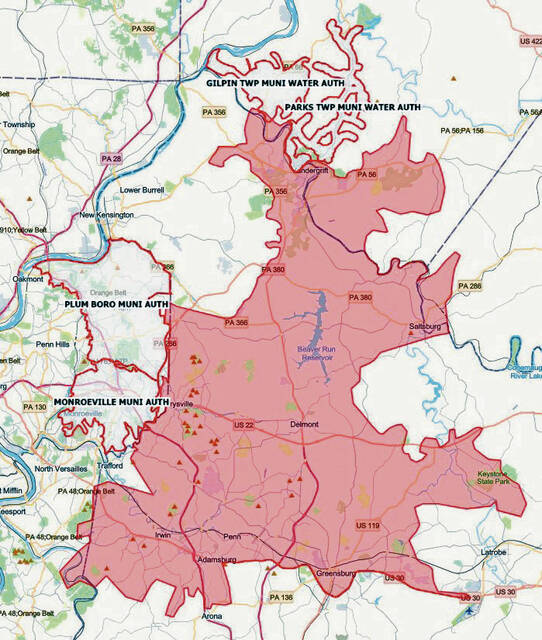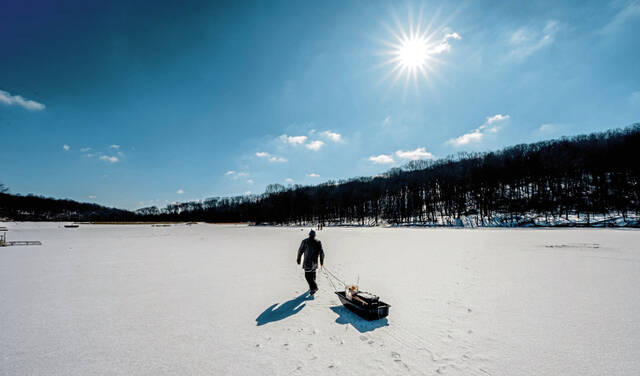The Municipal Authority of Westmoreland County water conservation warning issued this week has halted fracking activity at the Beaver Run Reservoir.
Authority officials on Friday said two energy companies that operate deep natural gas wells on the reservoir property will not be permitted to extract water for their operations amid the agency’s call for voluntary conservation prompted by drought-like conditions.
“They are cut off. There is no possibility for them to take raw water from the reservoir,” said Brian Hohman, MAWC’s business manager.
Water levels at the reservoir, which services the northern half of MAWC’s water system, have fallen in recent months as a result of the lack of rainfall. Earlier this week the authority issued a voluntary call for customers north of Route 30 to reduce water use and warned that levels at the reservoir are expected to continue falling and could result in the implementation of mandatory conservation measures as early as next week.
More than 56,000 MAWC customers, as well those who receive water from Monroeville, Plum, Gilpin and Parks Township municipal authorities, which buys water supplied from the Beaver Run Reservoir, are also asked to conserve.
The conservation effort also includes some locations south of Route 30, mostly in the North Huntingdon area. A map of the impacted areas can be found on MAWC’s website.
MAWC provides water to more than 122,000 customers in Westmoreland, Allegheny, Armstrong, Fayette and Indiana counties.
The Beaver Run Reservoir, when full, holds about 11.4 billion gallons. Dry conditions over the last several years has steadily reduced the reservoir’s volume. At the start of 2023 it contained about 7.7 billion gallons as elevations had fallen about three feet below average levels.
As of Friday, about 5.5 billion gallons remained in the reservoir, authority officials said.
CNX Gas Company and Olympus Energy operate about three dozen wells on the Beaver Run property and use water as part of their fracking efforts.
The companies have taken more than 301 million gallons out of the reservoir this year. Officials insist water used for fracking is not to blame for the falling reservoir levels.
A lack of rainfall is the primary cause, officials said. The area around the Beaver Run Reservoir said a more than 13-inch precipitation deficit over the last 12 months, according to reports.
Meanwhile, MAWC is allowed to take 35 million gallons of water each day from the reservoir. Hohman said the authority allocates about 21.5 million gallons for drinking water. Olympus is permitted by the state Department of Environmental Protection to withdraw up to 2.5 million gallons daily for its operations.
Olympus Vice President Jennifer Hoffman said the company backs MAWC’s moratorium for industrial uses of water from the reservoir.
“It’s part of the routine,” Hoffman said. “We can take a pause in our operations and eventually it will rain.”
CNX, according to state records, used more than 389,000 gallons of water over a month period in May and early June and as a result was cited by the DEP related to technical violations related to not having an updated usage plan with the state agency.
Rainfall on Friday is expected to help conditions at the reservoir. The authority also this week reallocated water supplied from it’s treatment plant near Connellsville, along the Youghiogheny River. As a result, the authority said it reduced water taken from the Beaver Run Reservoir by about 3 million gallons a day.
Officials said mandatory conservation, if enacted, would restrict the discretionary use of water such as for washing vehicles, watering grass and other outdoor activities. In-home routine uses of water would not be restricted, Hohman said.
“People can still drink water and there is no need to buy bottled water. There is still lots of water in the reservoir,” Hohman said.








